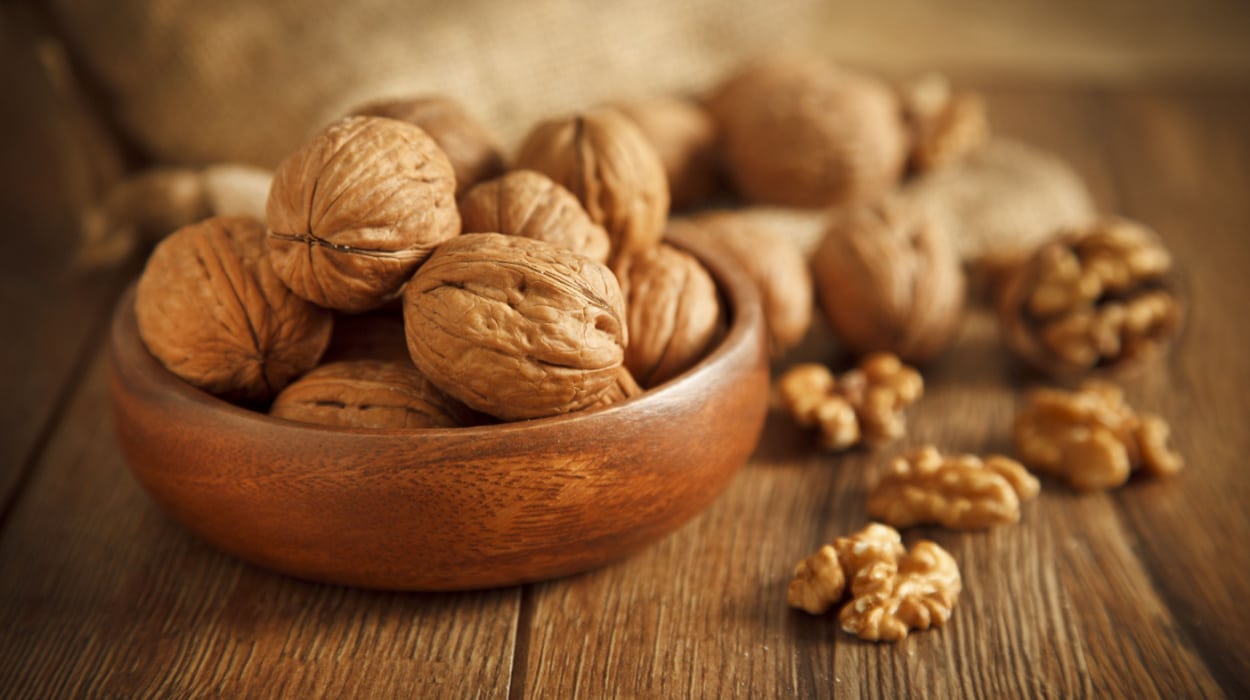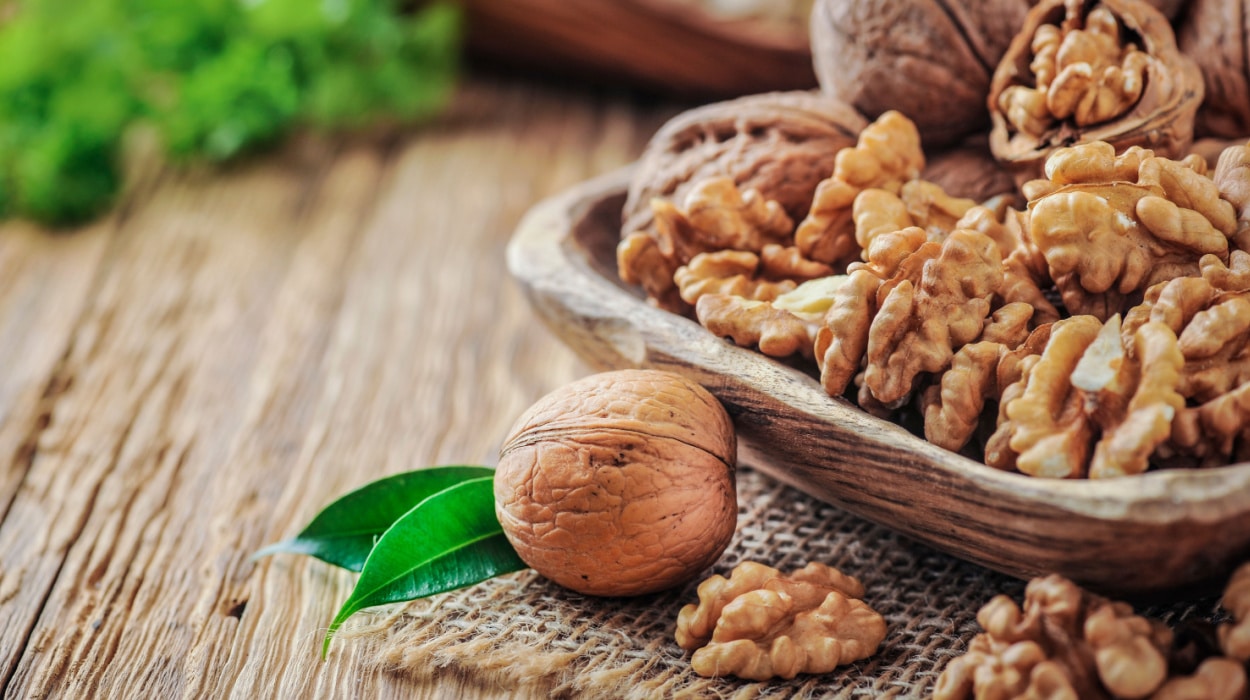In this article, we’ll explore the various walnuts benefits. We’ll also look into some potential risk factors related to walnut consumption and tips for choosing and storing them. Are you looking to improve your health outcomes, support weight control, or enjoy the taste and convenience of this versatile nut? There are plenty of benefits of walnuts to consider adding to your diet!
Walnuts are a tasty and nutritious addition to any diet. These tree nuts are a rich source of antioxidants, healthy fats, and other vital nutrients that can provide a wide range of health benefits.
Walnut Benefits – What Are They?
- Walnuts are rich in nutrients
- Walnuts may decrease inflammation
- Promote a healthy gut
- Support weight control
- May help manage and lower your risk of type 2 diabetes
- May help lower blood pressure
- Support healthy aging
- Support good brain function
- Support male reproductive health
- Improve blood fats
- A readily available and simple addition to any diet
- May help reduce the risk of certain cancers
- May help improve mood and reduce stress
What Are The Health Benefits Of Walnuts?
Walnuts Are Rich In Nutrients
One of the main reasons to eat walnuts is their nutrient content. These nuts are a good source of antioxidants, vitamins, and minerals, including vitamin E, manganese, and copper. They are also a rich source of plant-based omega-3 fatty acids. These combinations of nutrients, fats, and polyunsaturated fatty acids contribute to several health benefits, including anti-inflammatory properties, improved brain function, a lower risk of cardiovascular diseases,[1] and improved cardiovascular risk factors.
Walnuts May Decrease Inflammation
Inflammation is a normal immune response to injury or infection. Still, chronic inflammation can contribute to the development of various chronic diseases, including heart disease, diabetes, and cancer. Research suggests that walnuts’ antioxidants and healthy fats may have anti-inflammatory effects.
Promote A Healthy Gut
The gut microbiome is a complex community of bacteria that lives in the digestive tract. Your microbiome plays a crucial role in your overall health. Some research suggests that the fiber and other nutrients in walnuts may support the growth of beneficial bacteria in the gut and promote a healthy microbiome.
SupportsWeight Control
Eating a healthy diet that includes regularly eating walnuts may support weight control efforts. Some research suggests that the fiber and healthy fats in these nuts may help to reduce appetite and increase feelings of fullness, which may prevent weight gain.
May Help Manage And Lower Your Risk Of Type 2 Diabetes
Type 2 diabetes is a chronic condition affecting how the body processes sugar (glucose). Some research suggests that walnuts’ healthy fats, fiber, and antioxidants may help improve blood sugar control and lower the risk of developing type 2 diabetes.
May Help Lower Blood Pressure
High blood pressure (hypertension) is a risk factor for heart disease and stroke. Some research suggests that the antioxidants and other nutrients in walnuts may help to lower blood pressure and reduce the risk of these conditions.
Support Healthy Aging
Aging is a normal process that we all go through, but there are things we can do to support healthy aging and maintain good health as we get older. Some research suggests that walnuts’ nutrients help reduce inflammation, improve brain function, and support healthy aging.
Support Good Brain Function

The brain is a complex organ that plays a vital role in our overall health and well-being. Some research suggests that the essential fatty acids and other nutrients in walnuts may help to improve brain health and reduce the risk of age-related cognitive decline.
Support Male Reproductive Health
Male reproductive health is an essential aspect of overall health. Some research suggests that the nutrients in walnuts, particularly the omega-3 fatty acids, may support male reproductive health by improving sperm quality and motility.
Improve Blood Fats
The type and amount of fat in our diet can significantly impact our heart health. Walnuts are a good source of healthy fats, including monounsaturated and polyunsaturated fats. This nutrition may help to improve blood fats, such as cholesterol and triglycerides. Some research suggests that eating a diet that includes walnuts may help to lower LDL (harmful) cholesterol levels. It may also raise HDL (good) cholesterol levels, reducing heart disease risk.
Readily Available And A Simple Addition To Any Diet
One of the great things about walnuts is that they are widely available and easy to incorporate into your diet. You can find walnuts in most grocery stores, either on their own or as part of a variety of products, such as trail mix, snack bars, and baked goods. Walnuts are versatile ingredients in various dishes, including salads, oatmeal, and baked goods.
May Help Reduce The Risk Of Certain Cancers
Some research suggests that the nutrients in walnuts, particularly the antioxidants, may help to reduce the risk of certain types of cancer, including breast and prostate cancer. More research is needed to confirm these findings, but adding walnuts to your diet may be a simple way to support overall health.
May Help Improve Mood And Reduce Stress
Eating a diet with walnuts may help improve mood and reduce stress. Some research suggests that the omega-3 fatty acids in these nuts have an anti-inflammatory effect on the brain, which helps to improve mood and reduce stress.
Potential Side Effects When You Eat Walnuts

While walnuts are generally considered safe and well-tolerated, there are a few potential side effects. Some people may experience digestive issues, such as bloating or gas when they first consume large amounts of fiber. These symptoms are usually temporary. You can mitigate it by starting with a smaller serving size and gradually increasing as tolerated. It is also important to note that walnuts are high in calories. Consume them in moderation as part of a balanced diet.
How To Choose The Right Walnuts?
When shopping for walnuts, choosing high-quality nuts that are fresh and free of blemishes or cracks is essential. Look for plump walnuts that feel heavy for their size, as they are likely to be fresher and more flavorful. Walnuts are available in various forms, including whole, chopped, and as a paste (walnut butter). Choose the form that best meets your needs and preferences.
How To Store Walnuts?
Proper storage is critical to ensure that your walnuts stay fresh and retain quality. Whole walnuts can be stored in an airtight container in a cool, dry place for up to six months. Chopped walnuts should be stored in the refrigerator or freezer to prevent them from going rancid. Walnuts can also freeze for extended storage, but wrapping them well to prevent freezer burn is vital. Roasted and raw walnuts have nearly identical health benefits, so feel free to pick the version that tastes best for you.
Conclusion
In conclusion, walnuts have many health benefits, including improved gut health, weight control, and brain health. These nuts are a rich source of nutrients, including antioxidants, vitamins, and minerals. They help reduce inflammation, improve blood sugar control, and lower the risk of certain diseases. While there are some potential side effects, walnuts are a tasty and nutritious addition to any diet.
Frequently Asked Questions
Walnuts are a rich source of nutrients, including antioxidants, vitamins, and minerals. They may help to reduce inflammation, improve gut health, support weight control, and lower the risk of certain diseases, such as type 2 diabetes and heart disease.
One ounce (about 14 halves) of walnuts provides 4 grams of alpha-linolenic acid (ALA), which is about 47% of the daily value (DV) for adult men and 63% of the DV for adult women.
If you have a tree nut allergy, it is important to be cautious when consuming walnuts. Some people with tree nut allergies may also be allergic to walnuts, and vice versa. If you are still deciding, it is always a good idea to speak with a healthcare professional before adding any new food to your diet.
Yes, the skin of a walnut is edible. Most people prefer to remove the skin, which can taste slightly bitter.
Walnuts are not an exceptionally high protein source but provide some protein and other vital nutrients. One ounce of walnuts contains about 4 grams of protein.
Whole walnuts can be stored in an airtight container in a cool, dry place for up to six months. Chopped walnuts should be stored in the refrigerator or freezer to prevent them from going rancid. You can also freeze walnuts for longer storage, but wrapping them well to prevent freezer burn is important.
 Expert's opinion
Expert's opinion
